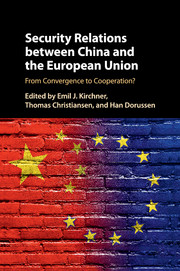Book contents
- Frontmatter
- Dedication
- Contents
- List of Tables
- Preface and Acknowledgements
- Abbreviations
- List of Contributors
- 1 EU–China Security Cooperation in Context
- 2 Chinese and EU Views of Military Security: Crafting Cooperation
- 3 Regional Solutions for Regional Confl icts? The EU, China and their Respective Neighborhoods
- 4 Aims versus Deeds: EU–China Cooperation in Nuclear Nonproliferation
- 5 Terrorism and Organized Crime: Common Concerns but Different Interests
- 6 Chinese and EU Climate and Energy Security Policy
- 7 Competing or Converging Claims on International Order? The EU, China and Human Security
- 8 Civil Protection: Identifying Opportunities for Collaboration
- 9 Cybersecurity and EU–China Relations
- 10 The Economic Security Dimension of the EU–China Relationship: Puzzles and Prospects
- 11 Is Securitizing Migration a Mandatory Choice? Lessons from the EU and China
- 12 Against the Odds: (Considerable) Convergence and (Limited) Cooperation in EU–China Security Relations
- Index
- References
11 - Is Securitizing Migration a Mandatory Choice? Lessons from the EU and China
Published online by Cambridge University Press: 05 September 2016
- Frontmatter
- Dedication
- Contents
- List of Tables
- Preface and Acknowledgements
- Abbreviations
- List of Contributors
- 1 EU–China Security Cooperation in Context
- 2 Chinese and EU Views of Military Security: Crafting Cooperation
- 3 Regional Solutions for Regional Confl icts? The EU, China and their Respective Neighborhoods
- 4 Aims versus Deeds: EU–China Cooperation in Nuclear Nonproliferation
- 5 Terrorism and Organized Crime: Common Concerns but Different Interests
- 6 Chinese and EU Climate and Energy Security Policy
- 7 Competing or Converging Claims on International Order? The EU, China and Human Security
- 8 Civil Protection: Identifying Opportunities for Collaboration
- 9 Cybersecurity and EU–China Relations
- 10 The Economic Security Dimension of the EU–China Relationship: Puzzles and Prospects
- 11 Is Securitizing Migration a Mandatory Choice? Lessons from the EU and China
- 12 Against the Odds: (Considerable) Convergence and (Limited) Cooperation in EU–China Security Relations
- Index
- References
Summary
The correlation between migration and security is still prominent more than a decade after the terrorist attacks in New York on September 11, 2001. While significant political authorities such as those in China and the EU have approached these issues from different perspectives, for European countries, having a strong and credible external border is crucial for the integration project. EU external migration practice has thus focused on keeping migrants out. This remains a defining feature of the EU's cooperation with neighboring countries (through the European Neighbourhood Policy) and key transit/source countries (through EU mobility partnerships) (Lavenex 2006). In China, internal movement has been of utmost concern as it involves some 236 million people (approximately 31.8 percent of the EU's total population) (CNBS 2013). Internal migration regulation in China has been viewed through the security lens because it is a question of social stability relating to urban–rural relations and the reduction of economic disparity that has characterized the period of economic reforms since 1978. By contrast, China's external migration control has been approached from the development angle as part of its shifting economic priorities and efforts at integrating the country into the global economy. Unlike the EU, China does not rely on external partners for migration regulation, and this has significant implications for future EU–China security cooperation on migration. In this chapter, EU and Chinese policies concerning migration, security and development are compared and contrasted to reveal their divergent approaches. EU migration strategies are shown to derive largely from a framework of border security, while Chinese migration policies have developed out of economic necessities. By outlining these differences, we ask: is it misplaced to focus on security when considering potential migration policy cooperation between the EU and China? The conclusion proposes ways forward.
China and EU Migration Cooperation: Divergence
As a key country of origin for most of the world's migrants, China has remained in the spotlight as the top partner for cooperation in the field of migration. This is especially the case when it comes to issues emanating from the security dimension of migration such as human smuggling and trafficking. In terms of multilateral engagement and global cooperation in the field of migration, however, China has limited participation.
- Type
- Chapter
- Information
- Security Relations between China and the European UnionFrom Convergence to Cooperation?, pp. 209 - 228Publisher: Cambridge University PressPrint publication year: 2016

